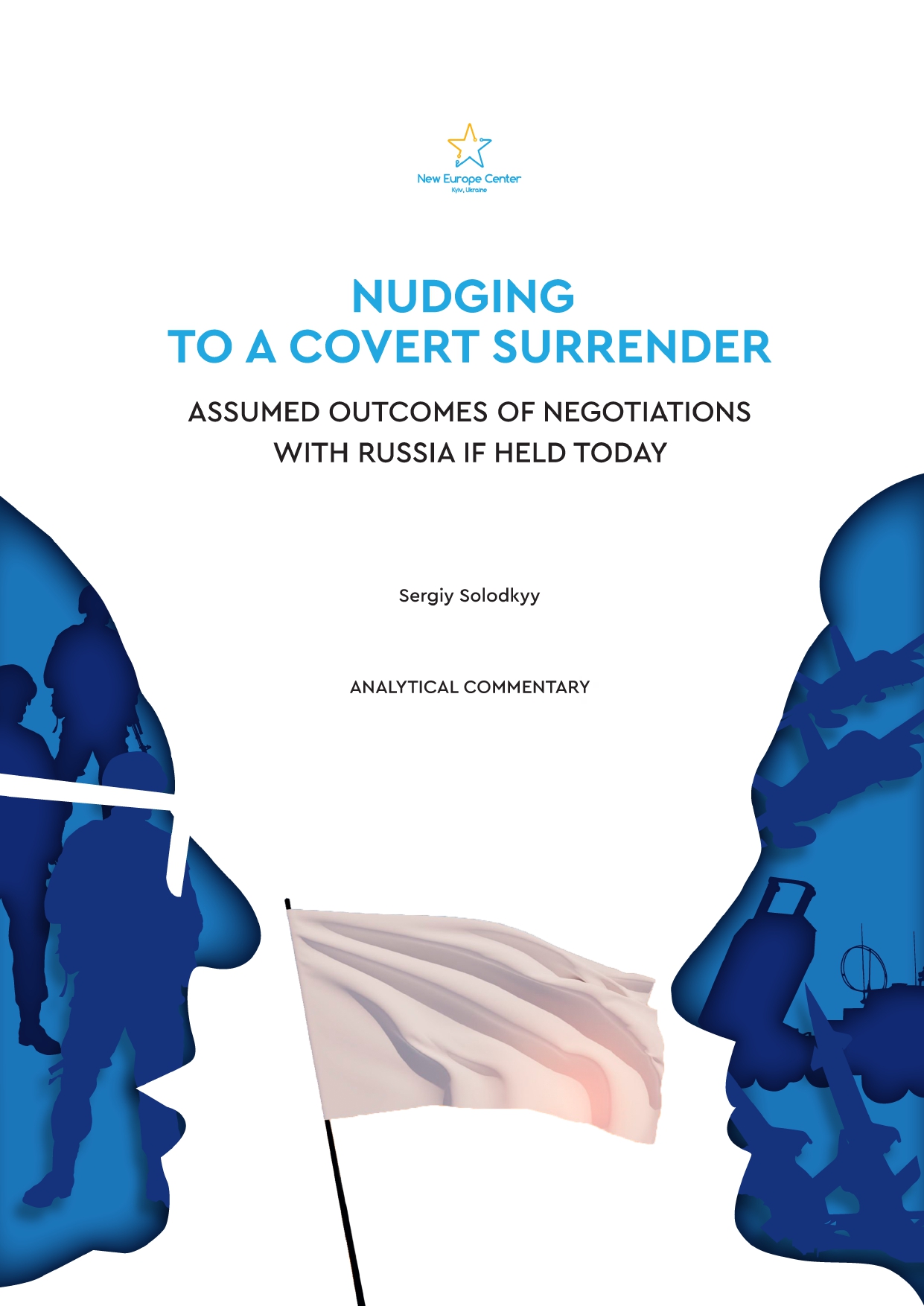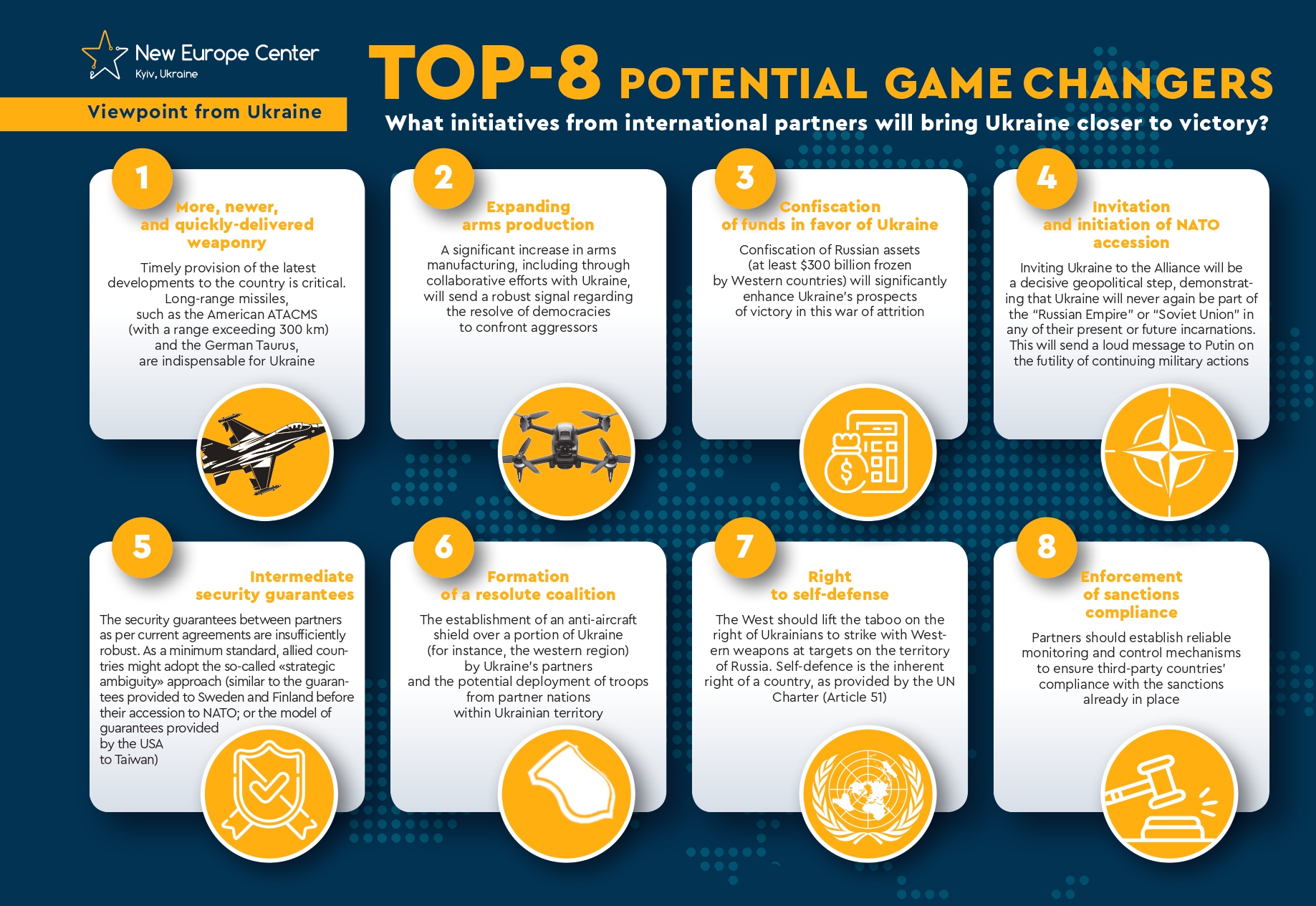
PDF-version is avialable here.
Though unwilling, a deficit of help from some Western countries nudges Ukraine to negotiate with Russia – in fact, to make concessions to Russia. In a few weeks, the first Peace Summit will be held in Switzerland, where conditions to end the Russian war are planned to be discussed. Foreign leaders are speaking ever louder about involving Russia in the negotiations. So far, Ukraine has managed to convince its partners that involving Moscow is irrelevant. However, this does not mean that the faction of countries that can be called “peace at any price” will back down from its intentions. It seems as if the states promoting early negotiations ignore the fact that by nudging Ukraine to negotiate given the current conditions they are playing along with Russia. Negotiations between Ukraine and Russia will be more like discussing surrender issues, even if certain countries have the most sincere intentions to return peace to Europe. And if China’s motives in calling for peace are clear (to inflict a strategic defeat on the West), then the same statements by Ukrainian friends are evidence of short-sightedness, at least. A few months ago, Switzerland, the host of the Peace Summit, made ambiguous statements.
Strategically, the highest danger for Ukraine is countries supporting and declaring the importance of Ukraine’s victory, while in practice, weakening the position of Ukrainians for various reasons, and in multiple ways.
COVERT SURRENDER
Following the unsuccessful general counterattack, it seemed obvious for the West to review its approach: dropwise military support for Ukraine had failed, therefore, thorough changes were needed. Fair enough, the Western countries should change their bit-by-bit approach to a kind of avalanche, that is, Ukraine should receive more and more weapons every week to eventually convince Russia of the lack of prospects for a long war. However, instead of the only proper conclusion, the key Western countries came to the only wrong one: they put weapons provision on a long pause (there are no reasons to deem such a pause deliberate, still, the point stands).
On paper, they declared large-scale support under the “as long as it takes” principle, while in practice, Ukraine was weakened due to slow and insufficient supplies. The prerequisites for this insufficient support were China, Turkey, Switzerland, and Slovakia, which were even more insistent in calling for negotiations. Ukrainian authorities managed to “shoot down” the idea of involving Russia in the negotiations at the summit in Geneva to be held in mid-June.
The faction of countries (latent capitulators, so to say) that do not mind “freezing” the conflict at its current stage is even larger. However, the main problem is not calls or hopes for negotiations but the fact that pretended supporters of pacifism (de facto, the faction of capitulators) see negotiations as a guarantee to solving all security problems. They do not take into account that such negotiations may not solve but increase challenges – or simply postpone them.
Russia is quite experienced in simulating diplomacy. It publicly declares readiness for negotiations, but in practice, it makes every attempt to disrupt them – or simply pursues its goals that have nothing to do with any previous bilateral agreements or international law. For example, during 2014 – 2022, Ukraine held about 200 negotiations with Russia (within the Minsk process framework). During the same period, there were 20 ceasefire agreements, all of which were breached by Moscow.
Has anything changed recently to make Russia interested in restoring peace? Unequivocal answer is: no! Our partners expecting Ukraine to be involved in any consultations with the Russians should be aware of this basic factor.
What conclusions on Russia’s readiness (or rather an unreadiness) can be drawn at this stage for the negotiation process? The following key features can be highlighted:
- Russia has just started a new military advance and does not plan to stop even for any hypothetical negotiations. Russia has started a new stage of military advance. Moreover, it is not going to stop military operations, even if the negotiations start (this is clearly stated by Sergei Lavrov, Russian Foreign Minister). Moscow’s official statements contradict the beliefs of some “pacifists” that any negotiations will result in ceasing fire on the front line (Robert Fico, Prime Minister of Slovakia, claimed the following: “It is better to negotiate peace for 10 years than to kill each other for 10 years without any result”). The Russian idea of negotiations: talk and kill at the same time.
- The negotiations will not discuss the return of the stolen property but the theft of what has not yet been stolen. Russia is not going to be guided by the principles of international law during negotiations. Moscow’s basic negotiating point is that Ukraine should give up the territories already occupied by Russia. In the veiled Russian wording, this cynical clause is presented as the need to take into account the “new reality”. The Russian authorities have also repeatedly stated that negotiations are another way for Moscow to achieve the goals set for war. It should be recalled here that four Ukrainian regions are already the Russian territories, according to the Constitution of the Russian Federation.
- Negotiations at gunpoint of “Iskander”. Russia continues to threaten attacks on countries that support Ukraine. For the first time, the Ministry of Foreign Affairs of Russia sent a related dip note back in April 2022. Since then, the number of such messages both at the official and non-official levels has only multiplied. Recently, the Ministry of Foreign Affairs of Russia threatened a nuclear attack against NATO countries. Such blackmail is hardly evidence of a desire to come to the negotiating table.
How does the pro-Ukrainian faction “reflect” these factors?
- Everything is decided by Ukraine, however, under the circumstances. Bit-by-bit weapons supplies and long-term interruptions in their delivery contributed to the success of the Russian plan. Even if the key Western countries did not seek to weaken Ukraine, they contributed to making it a reality.
- Budapest Memorandum updated. The USA and Germany (the main weapons suppliers) are not ready to discuss any political decisions ensuring the real security of Ukraine. Issues of bilateral guarantees and NATO membership cause either partners’ diplomatic silence or clear irritation. The promise to repeat the “Israeli model” in Ukraine remains yet a promise (the pace and volume of weapons deliveries are the best proof thereof).
- War without an enemy. Given constant threats from Moscow, some Western countries are afraid to admit that Russia is an enemy to be defeated. When France proposed to send troops to Ukraine, it caused such a surge of fear and disclaimers from other states as if helping Ukraine meant complicity in a war crime but not aid set in international law. A small reminder of the UN Charter: its Article 51 provides for the inherent right of a state that has become a victim of an armed attack “to individual or COLLECTIVE self-defense”.
Putin created a “Russian reality“ to be accepted. That said, the efforts of the Western countries are neither sufficient nor stable for Putin to accept “Western reality” – a reality requiring restoring peace based on international law.
NEGOTIATIONS TODAY MEAN AN EVEN LONGER WAR
Nowadays, even if the turning point has come, it is not the time to nudge Ukraine into negotiations. The turning point should mean a fundamental change in approaches to supporting Ukraine – they should be characterized by ambition, speed, and scale. If negotiations were to take place shortly, they would only result in undesirable consequences.
The primary and most important one is that negotiations will not end the war. Russia would drag on the negotiation process as long as the situation at the front line would allow it to advance there. Putin, inspired by the pause in supporting Ukraine, saw a window of opportunity; which would close as soon as the situation on the battlefield changed and he realized that a war of attrition had no prospects. Firstly, the situation can be changed by the new quality of weapons supplies.
Another important factor that does not contribute to Putin’s compliant behavior is public support in Russia. The war allowed him to silence criticism to a maximum extent (censorship, persecution, exile, murder, etc.). Putin discovered the formula to remain popular a long time ago – repression plus war. He came to power against the Russian-Chechen war, in 2014, his rating soared following the aggression against Ukraine, and a similar situation was observed after 2022. The assumption that Putin is more interested in negotiations than in war makes no sense – at least at this stage.
The second consequence of immediate negotiations is destabilization in Ukraine. The information environment (especially in social networks) has become more packed with messages about the alleged secret agreements between the Ukrainian and Russian authorities. All of these are related to the new stage of the Russian advance, which should presumably result in negotiations. Attempts to destabilize the situation in Ukraine using a “negotiating factor” are already obvious, as there is no evidence of such an agreement. While some Western politicians are concerned with ways to preserve Putin’s power (being anxious about the destabilization during the post-Putin period), the situation in Ukraine may worsen, which Moscow has always bet on. Let’s recall putting Ukrainian leaders on the wanted list, and the revealed attempt to assassinate Volodymyr Zelenskyy, Vasyl Maliuk, and Kyrylo Budanov – all this does not evidence any Putin’s desire to start negotiations.
The third consequence (risk) is an even greater slowdown in the weapons supply to Ukraine, suppressing (or even suspending) the aid provision in general. Most Western countries used to have the poor habit of bureaucratizing all support processes, where the urgency was characteristic only of Ukraine’s closest friends. Given the previous experience, Kyiv is afraid that the Western countries, lulled by the negotiation process, will easily take a new dose of sedatives to stop supporting Ukraine. If weapons supplies are interrupted during the hot phase of hostilities, one can only imagine the level of relaxation of the Western partners focusing on non-realistic discussions about future peace and reconstruction (let’s recall the period after Minsk-2 and until 2022). Before calling for or waiting for negotiations, the West must give reliable guarantees about its permanent support to Ukraine. The NATO Secretary General’s initiative to create a fund of EUR 100 billion to support financially the Ukrainian defense is the proper way of thinking but once again, certain Alliance member countries have declared their desire to block this idea. Russia interprets such signals as a manifestation of the weakness of the West, and, therefore, of Ukraine. Kyiv should maintain its advocacy activities to eventually get reliable security guarantees (not simple commitments). Hence, it should be recalled that the countries granted the US guarantees initially were given simple security promises – this applied to both South Korea and Japan (more details are available in the study “Security Formula ‘NATO Plus’” conducted by the New Europe Centre).
The fourth risk is encouraging potential aggressors to violate international law. The reaction of Ukraine and the West to the Russian war is a kind of historical model, which other aggressive states will use. Russia usually justifies its violating international law with similar actions of others – NATO bombed Serbia without any resolution of the UN Security Council, the USA started a war in Iraq under a false pretext, etc. A weak response of the West to aid Ukraine is an invitation not only to Russia but also to other countries to further aggression. The cheat sheet for any future aggressor is ready. The first lesson learned: the aggressor should better prepare for military operations – these should be in a blitzkrieg format. The second one: it is necessary to convincingly threaten nuclear attacks against Western countries. The third one: most Western countries will eventually accept the occupation of territories and attacks on other countries.
The main threat to the lulled Western countries will be that Russia resumes its claims to the entire Euro-Atlantic space following the successful solution of the Ukrainian issue. It should be remembered that Moscow’s demands only partially apply to Ukraine. Russia’s objective is to sign a new international document setting the redistribution of countries’ territories, terminating NATO expansion, and imposing additional conditions on the Alliance. The West will continue to live in fear that one day Russia will start a new war and carry out its nuclear threats as NATO is not going to fully implement Putin’s ultimatum issued in December 2021.
As a result, Ukraine and its partners will get no basis to end the war but only its continuation, which will postpone peace and force the key Western countries to make decisions they wish not to resort to. One war, which could have been ended by the quick defeat of Russia if not extended to infinity, can inspire potential aggressors to provoke new conflicts with impunity.
TURNING POINT
Appeals to the fact that Ukraine is not capable of holding the front line, therefore, negotiations are the best option, are groundless as Western countries that provided poor and untimely aid are not least responsible for failures on the battlefield. Any current solution should not somehow force a weakened Ukraine to the negotiating table but strengthen the country urgently.
Western politicians ask questions about the Ukrainian problems with mobilization even more often. However, to a large extent, today’s problems with mobilization reflect strategic mistakes Western partners made back in 2022. Ukrainian experts, politicians, and diplomats warned about the threat of prolonged war from the very beginning – the weapons supply was supposed to be stable and, by and large, unconditional.
Of all the options related to Ukraine, the West eventually chose the right ones though with considerable delay. Since 2014, Ukraine has been offering the West efficient steps that could have prevented a war scenario. However, the EU and the USA, when relying purely on diplomacy and half-measures, got the opposite result.
Ten years later, the West is still guided by the same principle – extra caution encouraging Russia to aggression. A comprehensive reminder: in response to the occupation of Crimea, the EU imposed sanctions against 21 citizens of Ukraine and Russia – the highest official affected was Serhiy Zhelezniak, Deputy Speaker of the State Duma. Mere foot soldiers were punished for an unprecedented violation of international law in European history after WWII. Volodymyr Putin had every reason to consider the EU fainthearted, which gave him hope: Europeans will soon cooperate again under the business-as-usual principle. When he begins destabilizing actions in the south and east of Ukraine, the USA makes it clear that Ukraine cannot count on any military support.
The further Putin went, the harder the decisions of the EU and the USA made. The problem was that these were always late and insufficient when approved. The West was responding when it should have come up with initiatives for Russia to respond. The desire to keep transatlantic unity while supporting Ukraine has forced and still forces Western leaders to focus not on solutions to defeat Russia but on those causing no harm to the interests of governments that are frightened or corrupted by Putin. Putin is interested in discord and conflicts between democratic countries, while the preservation of transatlantic unity based on fear makes the West look not strong enough to force the Kremlin to peace. Therefore, the decision to create a Coalition of the Determined – a coalition of states wishing to increase aid to Ukraine – was overdue (more details are available in Aliona Hetmanchuk’s thorough analysis entitled “Coalition of the Determined. What has been influencing European countries to not invest in victory for Ukraine”)
If the West believes in the importance of international law and the restoration of a stable and just peace in Europe, courage and determination should become the key factors to make new decisions. Ukraine has never denied the importance of negotiations though these should be based primarily on respect for international law. The West’s decisions had almost no result in making Putin reread the UN Charter without arbitrary interpretations.
New Europe Centre has developed its vision of initiatives to be taken by international partners that can contribute to forcing Russia into real, not simulated negotiations (see image below).








